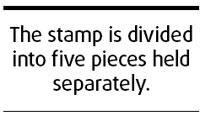Stamp of approval
Updated: 2008-01-15 07:19
There can be no limit to the creativeness of rural villagers when it comes to the democratic management of their own affairs. Such creativeness can be traced to the use of beans as votes in direct elections many years ago.

The dividing of a stamp into five pieces held separately by four village representatives and one member of the village branch of the Communist Party of China to prevent the abuse of power is the latest example of such creativeness.
Behind the division of the stamp is the power it represents which decides where and how collective money should be spent and how village affairs are decided.
That such a novelty was invented in a remote village of 347 villagers from 87 households with an average annual per capita income of less than 1,000 yuan ($136) in Guizhou province suggests how eager local villagers are for reasonable use of the money in the village's meager coffer and how suspicious they are of the absolute control of the village's finance by a single person.
The acceptance of this novelty by the newly elected village head and the villagers' committee is the very basis for the adoption of the five-piece stamp. But such acceptance has been won by the villagers after expressing distrust of the village's financial management by a majority vote in 2006. To be exact, the villagers' committee had to come up with a way of management that could be accepted by the majority. That is how the stamp was divided into five parts, which, instead of being kept by members of the villagers' committee, are separately in the hands of four village representatives elected by villagers and a member of the village branch of the Party.
Decision-making power is more dispersed by doing so. What is noteworthy is the fact the division of the stamp, rather than an expression of suspicion of any particular person within the villagers' committee, is more a distrust of power concentrated in the hands of a single person or the hands of several people of a vested interest group.
What is encouraging is the call by the county government of Jinping, where the village named Guiye is located, that the more than 100 villages under its auspice follow the example of the five-piece stamp to work out an effective way for the democratic management of their finance.
Direct election of the village head and democracy construction at that level is the hope of the country's future.
(China Daily 01/15/2008 page8)
|
|
|
|
|
|